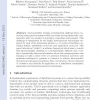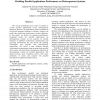139
click to vote
ISOLA
2010
Springer
15 years 15 days ago
2010
Springer
Abstract. Interoperability remains a fundamental challenge when connecting heterogeneous systems which encounter and spontaneously communicate with one another in pervasive computi...
133
click to vote
TC
2008
15 years 1 months ago
2008
High availability is a key requirement in the design and development of heterogeneous systems, where processors operate at different speeds and are not continuously available for ...
138
click to vote
ISSS
1995
IEEE
15 years 5 months ago
1995
IEEE
This paper presents a system level design methodology and its implementation as CAD tool for the optimization of heterogeneous multiprocessor systems. These heterogeneous systems,...
136
click to vote
HPDC
1996
IEEE
15 years 6 months ago
1996
IEEE
Fast networks have made it possible to coordinate distributed heterogeneous CPU, memory, and storage resources to provide a powerful platform for executing high-performance applic...
126
click to vote
HCW
2000
IEEE
15 years 6 months ago
2000
IEEE
Recently, we presented two very low-cost approaches to compile-time list scheduling where the tasks’ priorities are computed statically or dynamically, respectively. For homogen...
134
Voted
COLCOM
2009
IEEE
15 years 6 months ago
2009
IEEE
Abstract—For a complex distributed system to be dependable, it must be continuously monitored, so that its failures and imperfections can be discovered and corrected in a timely ...
110
click to vote
IPPS
2003
IEEE
15 years 7 months ago
2003
IEEE
The current technologies have made it possible to execute parallel applications across heterogeneous platforms. However, the performance models available do not provide adequate m...
107
click to vote
PDP
2010
IEEE
15 years 7 months ago
2010
IEEE
Abstract—Among the numerous DAG scheduling heuristics suitable for heterogeneous systems, the Heterogeneous Earliest Finish Time (HEFT) heuristic is known to give good results in...
129
click to vote
IRI
2005
IEEE
15 years 7 months ago
2005
IEEE
Heterogeneous systems are systems that obey different functioning laws. For instance, during the design of embedded systems, it is generally necessary to study both the controller...
126
click to vote
IEEEARES
2006
IEEE
15 years 8 months ago
2006
IEEE
The raising need for e-government applications leads to many new approaches in this sector. To fulfill the requirement for a flexible government-to-government (G2G) software sys...



